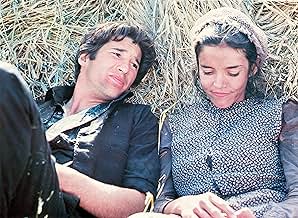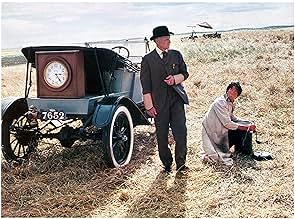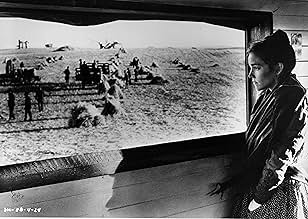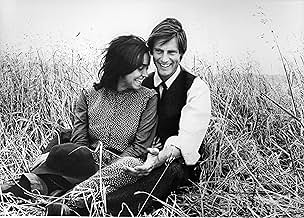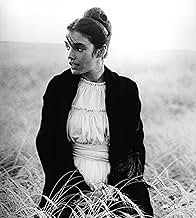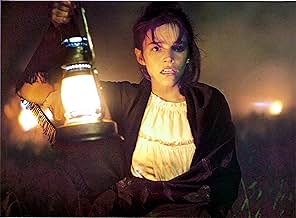Um fazendeiro de temperamento fogoso convence a mulher que ele ama a se casar com seu chefe rico, mas moribundo, para que eles possam reclamar sua fortuna.Um fazendeiro de temperamento fogoso convence a mulher que ele ama a se casar com seu chefe rico, mas moribundo, para que eles possam reclamar sua fortuna.Um fazendeiro de temperamento fogoso convence a mulher que ele ama a se casar com seu chefe rico, mas moribundo, para que eles possam reclamar sua fortuna.
- Ganhou 1 Oscar
- 13 vitórias e 13 indicações no total
Robert J. Wilke
- The Farm Foreman
- (as Robert Wilke)
Timothy Scott
- Harvest Hand
- (as Tim Scott)
Terrence Malick
- Mill Worker
- (não creditado)
Avaliações em destaque
This movie was a full and happy surprise for me. This man, Malick, stood twenty years out of business because he had to be, afterwards, after such a beautiful movie he couldn't and shouldn't return with any other thing shorter than this.
Days Of Heaven is absolutely perfect cinema, the plot is not important, Malick simply wants to fill your senses and he achieves it.
I haven't had the chance to watch it in a theatre, I was four years old at the time, I've watched it on television, and I understood immediately, this man is a hero for building up such a magnificent film in the United States, in Hollywood.
A true director builds a universe of his own, with its own "time flow" and dreams and that is what Malick achieved with this film, magic, sacral art. Some sequences are "almost" (a big almost) Tarkovskyand this is a big commendation.
Days Of Heaven is absolutely perfect cinema, the plot is not important, Malick simply wants to fill your senses and he achieves it.
I haven't had the chance to watch it in a theatre, I was four years old at the time, I've watched it on television, and I understood immediately, this man is a hero for building up such a magnificent film in the United States, in Hollywood.
A true director builds a universe of his own, with its own "time flow" and dreams and that is what Malick achieved with this film, magic, sacral art. Some sequences are "almost" (a big almost) Tarkovskyand this is a big commendation.
Oh, I better come out and say it: I love Terrence Malick. I think he's one of the few filmmakers who has completely and utterly captured filmic form. "The Thin Red Line" was, to me, an astonishing experience; beautiful, horrific and the best movie of the 90s. "Badlands" is the best lovers-on-the-lam movie I've ever seen (it certainly makes "True Romance" look like a gimmicky fraud of a movie). Malick somehow manages to make everything seem painfully beautiful: his landscape, his actors, his dialogue. There's something always elegiac about his movies.
There's a picture of James Dean I saw from his youth -- a baseball team photo -- and the caption said something about how it captured his face, and in it, wisdom and sadness far beyond his years. That's what Malick does in his films and particularly in this film.
He must have been a fan of James Dean (probably one of the reasons he chose to make "Badlands," as a sort of homage), but not in the sense that coolness comes from a perfectly combed coiffure, a red leather jacket (which it wasn't -- it was a windbreaker) and a dark brood. There's a similar story here to that of "Giant," set on a farm with that remarkable house, two men and one girl. Only "Giant" didn't have a philosophizing and very strange little girl. It was also an overblown soap opera and while this film is, I guess, a melodrama, it certainly isn't melodramatic.
If Malick is anyone in the film, he's Sam Shapard; watching his love through a lens. Malick uses Manz as a sort of channel. If this is indeed some fashion of his own story, Malick tells us through her, with he visualized by Shepard, which is a somewhat brilliant approach. Manz is strangely philosophical; at once blunt and abstract. The story is obviously centered around her -- I don't see why this wouldn't be obvious -- but she's pushed into the background, commenting on the characters and informing us like God from above.
As always with Malick, his film is mesmerizing and hypnotic. I was surprised that the film was only a little over an hour-and-a-half. The great Ennio Morricone created a wonderful score for this film that seems to forebode impending doom. Unlike his more famous spaghetti western scores, it's never overly-flamboyant. And the cinematography, listed as belonging to Nestor Almendros, but well-known to be at least substantially contributed to by Haskell Wexler, is so much like an oil painting that it's just about liquid film. I'd be willing to pay a lot of money to see this one on the big screen.
It might seem obvious to state that this film is a transition between "Badlands" and "The Thin Red Line," after all it was the middle film. But this film has moments, especially in the finale, that are surprisingly close to that of "Badlands" and this is the film where Malick fully mastered his approach of lush, visual poetry told at a languid pace that never seems boring, since you're fully within the film;s grasp.
Pauline Kael said in her review that "the film is an empty Christmas tree: you can hang all your dumb metaphors on it." And Charles Taylor, always following Kael's lead (even from beyond the grave), said of Malick's two 1970s films, "Next to the work of Altman, Scorsese, Coppola, De Palma and Mazursky from that period, they're pallid jokes."
What never fails to get me furious is when someone viciously attacks a director, like Malick, for being self-indulgent. Of course it's self-indulgent, he's telling a story that means something to him and trying to share what he feels with us. Malick certainly isn't trying to alienate people, and if you are alienated by his films, well, don't watch them. Malick is a filmmaker like Kubrick, but more fluid and much less abrasive. I mean, if you're going to aggressively attack a filmmaker, aggressively attack someone who is aggressive on his side. Directors like Malick use abstractions to engage their audiences more fully than most. By leaving things -- often feelings -- open to interpretation, the film becomes more intimate.
Certainly one of the most enduring films from the 70s, this is a masterwork.
****
There's a picture of James Dean I saw from his youth -- a baseball team photo -- and the caption said something about how it captured his face, and in it, wisdom and sadness far beyond his years. That's what Malick does in his films and particularly in this film.
He must have been a fan of James Dean (probably one of the reasons he chose to make "Badlands," as a sort of homage), but not in the sense that coolness comes from a perfectly combed coiffure, a red leather jacket (which it wasn't -- it was a windbreaker) and a dark brood. There's a similar story here to that of "Giant," set on a farm with that remarkable house, two men and one girl. Only "Giant" didn't have a philosophizing and very strange little girl. It was also an overblown soap opera and while this film is, I guess, a melodrama, it certainly isn't melodramatic.
If Malick is anyone in the film, he's Sam Shapard; watching his love through a lens. Malick uses Manz as a sort of channel. If this is indeed some fashion of his own story, Malick tells us through her, with he visualized by Shepard, which is a somewhat brilliant approach. Manz is strangely philosophical; at once blunt and abstract. The story is obviously centered around her -- I don't see why this wouldn't be obvious -- but she's pushed into the background, commenting on the characters and informing us like God from above.
As always with Malick, his film is mesmerizing and hypnotic. I was surprised that the film was only a little over an hour-and-a-half. The great Ennio Morricone created a wonderful score for this film that seems to forebode impending doom. Unlike his more famous spaghetti western scores, it's never overly-flamboyant. And the cinematography, listed as belonging to Nestor Almendros, but well-known to be at least substantially contributed to by Haskell Wexler, is so much like an oil painting that it's just about liquid film. I'd be willing to pay a lot of money to see this one on the big screen.
It might seem obvious to state that this film is a transition between "Badlands" and "The Thin Red Line," after all it was the middle film. But this film has moments, especially in the finale, that are surprisingly close to that of "Badlands" and this is the film where Malick fully mastered his approach of lush, visual poetry told at a languid pace that never seems boring, since you're fully within the film;s grasp.
Pauline Kael said in her review that "the film is an empty Christmas tree: you can hang all your dumb metaphors on it." And Charles Taylor, always following Kael's lead (even from beyond the grave), said of Malick's two 1970s films, "Next to the work of Altman, Scorsese, Coppola, De Palma and Mazursky from that period, they're pallid jokes."
What never fails to get me furious is when someone viciously attacks a director, like Malick, for being self-indulgent. Of course it's self-indulgent, he's telling a story that means something to him and trying to share what he feels with us. Malick certainly isn't trying to alienate people, and if you are alienated by his films, well, don't watch them. Malick is a filmmaker like Kubrick, but more fluid and much less abrasive. I mean, if you're going to aggressively attack a filmmaker, aggressively attack someone who is aggressive on his side. Directors like Malick use abstractions to engage their audiences more fully than most. By leaving things -- often feelings -- open to interpretation, the film becomes more intimate.
Certainly one of the most enduring films from the 70s, this is a masterwork.
****
10katsat
If any movie could be called filmed poetry, this would be it. From its first opening shot to its last frame, there is such lyricism and emotion and beauty that it almost leaves you speechless. I have not seen this movie in years, but it still affects me and I want to write about it. There is a pervading sadness to the movie, like a memory of something wonderful that could have been, that should have been, that almost was, and is all the more tragic because it was in your hands but slipped through your fingers. This is not a movie for everyone, but if you believe that film can be one of the highest forms of art, this is the film to see.
"Days of Heaven" is a beautiful film with fantastic panoramic cinematography. It's hard to say what it is about this film that captivated me from the start. I didn't expect to enjoy it when I read about the plot. Farm workers? How could that be interesting... But oh, the haunting, heavenly silence of the fields undulating in the wind, a silence not sundered by any garish music. Everything about this film is tangible, real, alive. The dialogue is sparse, believable, the bond between Bill and Abby is one of quiet passion that needs no dramatic proclamations to fuel it. And Sam Shepard's farmer is touching. I don't use that word very often, but I'll venture it here. I have watched this film now several times, and it is a delight each time when the farmer first sees Abby. This perhaps the strongest and most believable love triangle ever put to film, and in my opinion, the most compelling.
Days of heaven is exactly what this is. The magic hour (when much of the film was shot), those moments before dawn and after dusk when everything is indirect, dreamlike, breathless, heartwaking. There's no real story, as such. Sure, there's a general plot line which should satisfy any casual viewer. This isn't, after all, a hard film to follow. It is simply that the environment is the main character as opposed to the human elements. Linda Manz's young character narrates the story sporadically, like a sleepy traveler beside the campfire telling you of half-forgotten memories, and wonderful, casual observations that will seem clearer in the morning light, but no longer worth mentioning. Her voice is halting and uncertain, belying a personality that is confident in all other respects. Other actors, good (Brooke Adams, Sam Shepard) and not-so-good (Richard Gere) blend in perfectly. Their performances are so understated that you forget they are actors playing characters. Even Richard Gere, who never learned subtlety and would never again employ it, is almost invisible here.
This is not a long film. For all its leisurely pace, ninety-six minutes is all it needs to tell its tale. Terrence Malick is out for sight and sound. There is nothing lost to unneeded expression, nothing not shared in the space in front of you. That leaves cinematographer Néstor Almendros with the freedom to photograph, to observe without opinion whatever seems to be happening most openly before him.
When I first finished watching "Days of Heaven" it felt like waking from a dream. I couldn't be sure how much time has passed. It seemed so long, but the silence was the same, and little had changed outside my window. Nothing but the heavy quiet was all around me, and I felt the desperate desire to move. Everything beneath my feet felt moving, quietly slipping past and all I had to do was put soles to earth and start walking. This is a film of photographs, images of the purest sort. Open your eyes.
This is not a long film. For all its leisurely pace, ninety-six minutes is all it needs to tell its tale. Terrence Malick is out for sight and sound. There is nothing lost to unneeded expression, nothing not shared in the space in front of you. That leaves cinematographer Néstor Almendros with the freedom to photograph, to observe without opinion whatever seems to be happening most openly before him.
When I first finished watching "Days of Heaven" it felt like waking from a dream. I couldn't be sure how much time has passed. It seemed so long, but the silence was the same, and little had changed outside my window. Nothing but the heavy quiet was all around me, and I felt the desperate desire to move. Everything beneath my feet felt moving, quietly slipping past and all I had to do was put soles to earth and start walking. This is a film of photographs, images of the purest sort. Open your eyes.
Você sabia?
- CuriosidadesThe shot of locusts ascending to the sky was shot in reverse with the helicopter crew throwing peanut shells down, and actors walking backwards.
- Erros de gravaçãoTowards the end of the movie, Bill fires three shots from a double-barreled shotgun without reloading.
- Trilhas sonorasEnderlin
Written and Performed by Leo Kottke
Used by permission of Overdrive Music A.S.C.A.P. Copyright 1978
Principais escolhas
Faça login para avaliar e ver a lista de recomendações personalizadas
- How long is Days of Heaven?Fornecido pela Alexa
Detalhes
- Data de lançamento
- País de origem
- Idiomas
- Também conhecido como
- Dias de Paraíso
- Locações de filme
- Lethbridge, Alberta, Canadá(Lethbridge Viaduct High Level Railroad Bridge)
- Empresa de produção
- Consulte mais créditos da empresa na IMDbPro
Bilheteria
- Orçamento
- US$ 3.000.000 (estimativa)
- Faturamento bruto nos EUA e Canadá
- US$ 3.446.749
- Faturamento bruto mundial
- US$ 3.492.909
- Tempo de duração1 hora 34 minutos
- Cor
- Proporção
- 1.85 : 1
Contribua para esta página
Sugerir uma alteração ou adicionar conteúdo ausente





